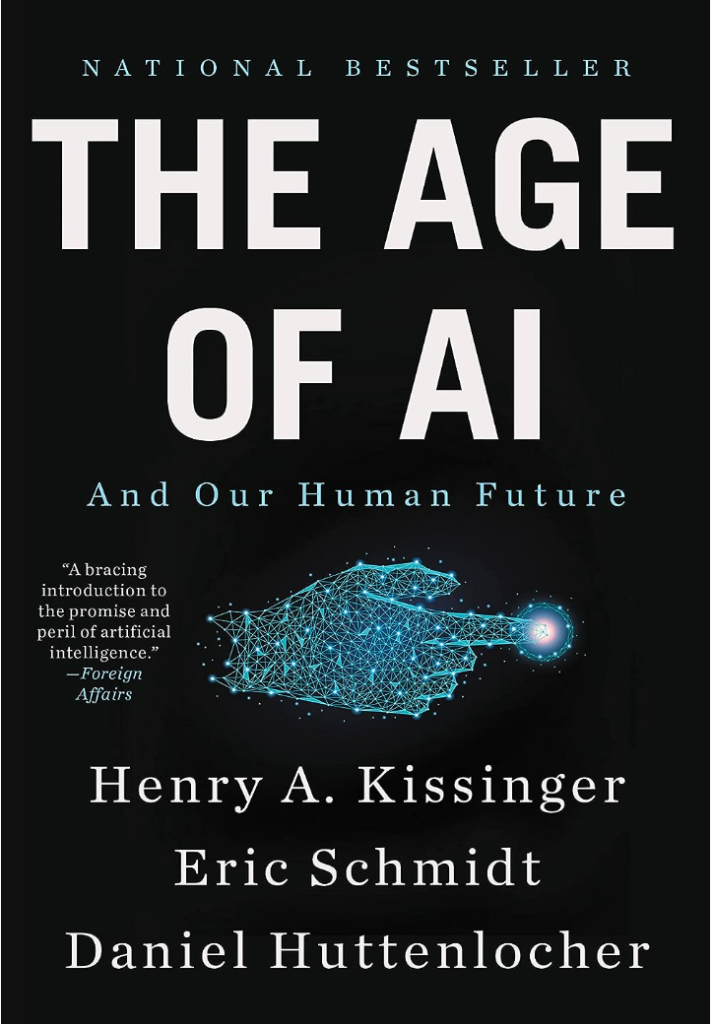By Ambassador Arben Cici
Three of the world’s most accomplished and deep thinkers come together to explore Artificial Intelligence (AI) and the way it is transforming human society—and what this technology means for us all.
In the book “The Age of AI And Our Human Future” Henry A Kissinger, Eric Schmidt, Daniel Huttenlocher, together consider how AI will change our relationships with knowledge, politics, and the societies in which we live.
In seven chapters they analyze almost all the fields of the current world society. Especially the 5th one, “Security and World Order”, is focused on the historical importance of security as a fundamental objective for organized societies. The authors highlight the Cold War era when major powers developed technologically advanced militaries but refrained from using them against each other or smaller nations. The advent of artificial intelligence (AI) now poses challenges that could complicate modern strategy beyond human comprehension.
The authors stress that nations must acknowledge the security dimensions of AI. They caution that if the United States and its allies hesitate in embracing AI technologies, it might not lead to a more peaceful world. As AI brings transformations that challenge traditional security concepts, there’s a necessity for defining AI-related strategic doctrines before these changes become inevitable.
Drawing parallels with the development and use of nuclear weapons, the authors note that despite efforts to develop nuclear weapons, there has never been a clear strategic doctrine or moral principle for their use. The Cold War witnessed various strategies to manage the threat of nuclear war, including the doctrine of mutual assured destruction (MAD).
Two contemporary challenges discussed in this chapter are cyber conflict and AI. The authors emphasize the difficulty of conceptualizing arms control measures for cyber weapons due to the ambiguity surrounding terms like cyberattack and cyberwar. They highlight the paradox that the greater a society’s digital capacity, the more vulnerable it becomes to cyberattacks.
The introduction of nonhuman logic through AI to military systems is seen as transformative, introducing a layer of incalculability. AIs can make decisions faster than humans, and their use in weapons systems expands tactical options and enables unconventional targeting. AI has a dual-use nature, being applicable to both military and civilian domains.

The authors express concerns about the public nature of AI development, allowing countries to copy and transmit it. The opacity of AI-driven strategies may lead to the belief that AI assistance is necessary to understand adversaries’ capabilities and intentions. This poses challenges to the quest for reassurance and restraint.
“An Old Quest in a New World” is called a sub-chapter deeply addressing the transformative impact of artificial intelligence (AI) on global security. The authors stress the need for major technologically advanced countries to recognize the profound changes AI brings, comparing it to the significance of the advent of nuclear weapons. They propose the establishment of national bodies to consider the defense and security aspects of AI, emphasizing the importance of competitiveness, research coordination, and the prevention of unwanted escalation.
The authors argue that the primary AI powers, particularly the United States and China, should acknowledge the reality of this strategic transformation. They suggest that “whatever other contests and emerging period of rivalry US and China should seek consensus that they will not enter into a technologically advanced war with each other” and propose the creation of units within each government to monitor and report on potential dangers, fostering dialogue to avoid unintended crises.
Highlighting the paradox of international relations, the chapter emphasizes the balance between a power’s drive to maximize its security and the need for a sense of responsibility to maintain general peace. It discusses the challenge of adapting long-held strategic logic to the AI age, emphasizing the importance of preventing AIs from undertaking irreversible actions faster than human decision-makers can intervene.
The authors outline six primary tasks for leaders in controlling arsenals that include conventional, nuclear, cyber, and AI capabilities. These tasks involve (1)regular communication between rival nations about the forms of war they wish to avoid (as their predecessors did during the Cold War), (2)revisiting the challenges of nuclear strategy (as former secretary of state, George Schultz told Congress in 2018 about Hiroshima and Nagasaki, “ I fear people have lost that sense of dread”), (3)defining doctrines and limits for cyber and AI powers, (4)conducting internal reviews of command-and-control systems, (5)creating methods of maximizing decision time during heightened tension and extreme crises (In a crisis, human being must bear final responsibility for whether advanced weapons are deployed), and (6)considering efforts to limit the proliferation of military AI (If a disruptive and potentially destructive new technology is permitted to transform the militaries of the world’s most inveterately hostile or morally unconstrained governments, strategic equilibrium may prove difficult to attain and conflict then uncontrollable).
It emphasizes constantly the duty of technologically advanced countries to remain at the forefront of AI research and development but also underscores the importance of understanding limits. It stresses the need for discussions among major powers on cyber and AI weapons to establish a common vocabulary and mutual restraint on the most destructive capabilities. The authors argue that history will not forgive a failure to set limits as humanity competes in creating new, evolving, and intelligent weapons in the era of artificial intelligence.
In conclusion, this exceptional book provides a comprehensive exploration of the challenges and responsibilities posed by AI not only in the realm of global security but also in all aspects of the current society and our life.
Three of the world’s most accomplished and deep thinkers are calling and ringing the alarm bell, as well, for international cooperation, diplomacy, dialogue, and ethical considerations to navigate the complexities of this transformative technology and ensure its responsible use for the preservation of humanity not its destruction. Their call is not a fatalistic but realistic, and at the right time.
“We are in a new phase of human history. We have not possible way to avoiding it. The only choice we have is to use it constructively or be engulfed by it”.
Henry Kissinger on the AI.
About the author:
Ambassador Arben Cici, is a Professor of International Relations in the Mediterranean University of Albania, Pro-rector for International Relations, he is leading the Albanian Diplomatic Forum. Former Ambassador & Foreign Policy Adviser of the President of Albania.




